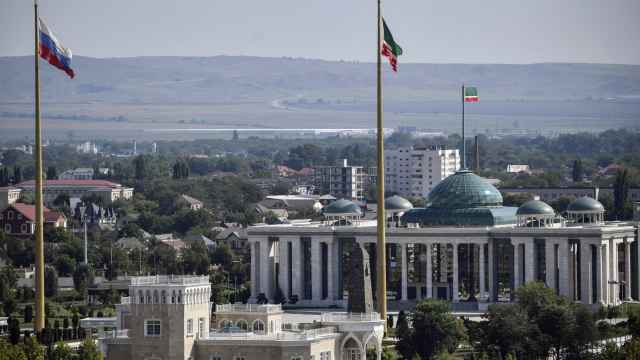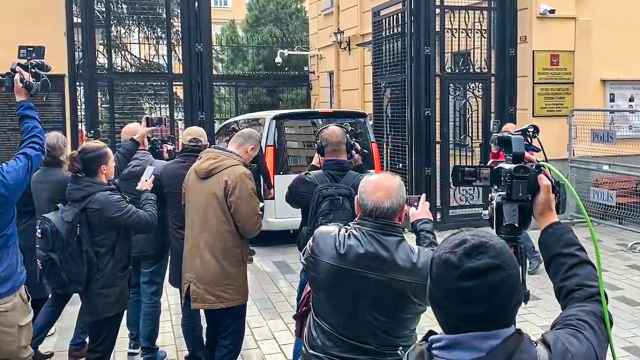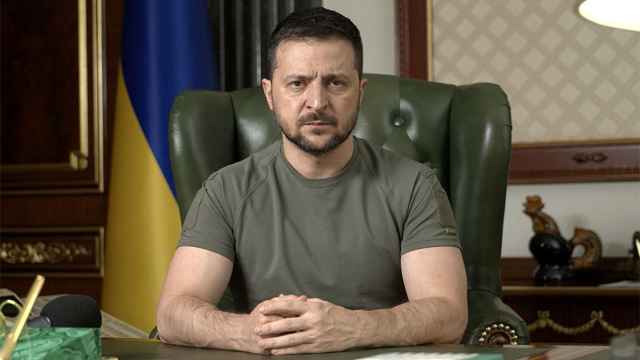The Mikhail Khodorkovsky affair is a classic tragedy — a plot unfolding against the backdrop of modern democratic mass culture. This became clear recently when Ekho Moskvy radio dedicated a full day of coverage to ballerina Anastasia Volochkova’s condemnation of an open letter by 55 signatories. That missive had various public figures speaking out in defense of the Russian judicial system’s handling of the Khodorkovsky case.
Volochkova’s current stance is a shift from 2005, when she signed a letter very similar to the one she now condemns. That is precisely the type of performance we have come to expect from Volochkova, a colorful figure whose exploits frequently grace gossip column headlines. Just before she was poised to become a cover girl for the human rights cause, she posted photos on the Internet of herself lounging nude on a Maldivian beach.
This tragedy has its roots in the so-called wild 1990s, a time when President Boris Yeltsin recklessly handed out the state’s priceless natural resource wealth with a wave of his royal hand, demanding in return unwavering loyalty from the young billionaires he minted with his Midas touch. Many of them, including Khodorkovsky, eagerly sold their souls in what U.S. Vice President Joe Biden termed a “Faustian bargain” during his March 10 speech at Moscow State University. Those deals were written in blood and had no exit clause except in those cases when the devil himself intervenes.
By appointing his own presidential successor, Yeltsin proved that the devil would honor his side of the bargain. Soon after, however, Khodorkovsky began behaving as if he were a self-made oligarch who owed nothing to the devil. Putin was left with no other choice but to send him to hell. But modern democracy had no mechanism for punishing these types of crimes. In effect, Putin should have issued a royal decree stating that:
- Khodorkovsky had betrayed his trust;
- His fate should be a lesson for other would-be renegades;
- Somebody should do time for the crimes of the 1990s; otherwise, the first person to come to power through free elections would imprison those acquired huge assets from the state for kopeks in the 1990s, as well as those who gave it away; and
- I don’t much like Khodorkovsky personally.
All of this would have been logical under a Faustian bargain, but it would be hard to imagine a such a forthright approach from the devil who has to cater to democratic hypocrisy.
This is where it gets really absurd. Can you imagine Mephistopheles filing a lawsuit to put a lien against Faust’s soul?
There was a lot of noise over this case — the debate over the rulings by Moscow’s Basmanny District Court, Biden, Volochkova, open letters and counter open letters or the recent documentary film by Andrei Karaulov recently posted on the Internet purporting that Khodorkovsky was directly involved in serial killings. But all of this has no bearing on the main story — Khodorkovsky’s belated attempt to gain back his lost soul from Mephistopheles-Putin, who claims he has rightfully inherited it.
Both of the protagonists in this classic tragedy deserve respect: Khodorkovsky for his singular fortitude and Putin for bothering to pretend he observes proper legal procedure.
But the only winner to emerge from this struggle has been Volochkova. The image of her naked breasts lightly sprinkled with sand as she lies on an exotic foreign beach has become the same symbol of Russian freedom as were the exposed breasts of the young goddess-like figure in “Liberty Leading the People,” the famous painting by Eugene Delacroix that symbolized French liberty.
Alexei Pankin is the editor of WAN-IFRA-GIPP Magazine for publishing business professionals.
A Message from The Moscow Times:
Dear readers,
We are facing unprecedented challenges. Russia's Prosecutor General's Office has designated The Moscow Times as an "undesirable" organization, criminalizing our work and putting our staff at risk of prosecution. This follows our earlier unjust labeling as a "foreign agent."
These actions are direct attempts to silence independent journalism in Russia. The authorities claim our work "discredits the decisions of the Russian leadership." We see things differently: we strive to provide accurate, unbiased reporting on Russia.
We, the journalists of The Moscow Times, refuse to be silenced. But to continue our work, we need your help.
Your support, no matter how small, makes a world of difference. If you can, please support us monthly starting from just $2. It's quick to set up, and every contribution makes a significant impact.
By supporting The Moscow Times, you're defending open, independent journalism in the face of repression. Thank you for standing with us.
Remind me later.





